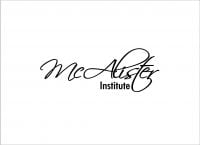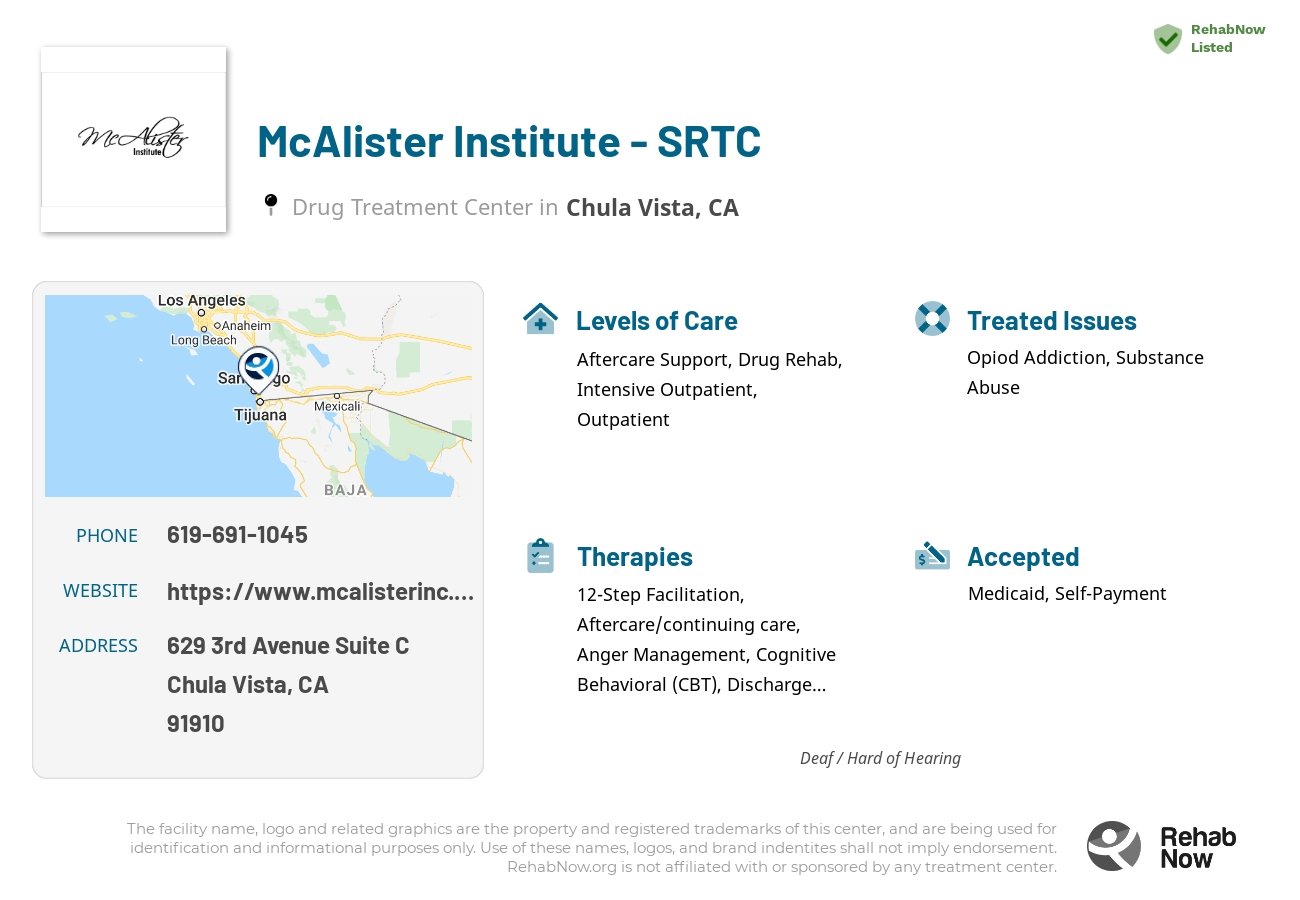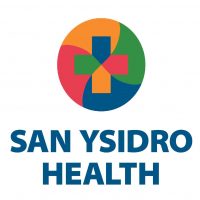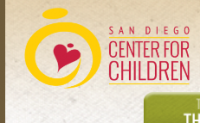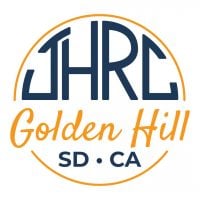McAlister Institute - SRTC
Drug Rehab Center in Chula Vista, California
The McAlister Institute - SRTC is a highly-rated, long-standing drug rehab center in California that offers a range of treatment options and 24/7 care, including residential services, outpatient programs, interventions and detox support, as well as aftercare assistance to help people achieve sobriety.
About This Chula Vista, CA Facility
McAlister Institute - South Teen Recovery Center is an addiction treatment facility located in Chula Vista, California. Founded in 1977, the center has been dedicated to providing comprehensive care to individuals suffering from opioid addiction, substance abuse, drug addiction, and mental health issues. Affiliated with the renowned McAlister Institute, this facility offers various levels of care including detoxification, intervention services, residential treatment, intensive outpatient programs, and outpatient support. With a commitment to helping teenagers overcome their struggles with addiction, the McAlister Institute - South Teen Recovery Center serves as a valuable resource for the Chula Vista community.
At McAlister Institute - South Teen Recovery Center in Chula Vista California, individuals struggling with addiction can access a wide range of services tailored to their needs. Considered a trusted provider in the area of alcohol and drug treatment, this facility offers aftercare support to help individuals maintain sobriety after completing treatment. With a focus on individualized care and recovery plans, McAlister Institute - South Teen Recovery Center provides comprehensive drug rehab services including detoxification programs and intervention programs to effectively address substance abuse issues. Besides residential treatment options for those requiring intensive support, they also offer outpatient services allowing patients to receive ongoing therapy while continuing with their daily routines. Through evidence-based practices and specialized interventions such as cognitive-behavioral therapy and relapse prevention techniques, this center aims to empower individuals towards sustainable recovery journeys.
Genders
Ages
Modality
Additional
Conditions and Issues Treated
Substance abuse refers to the intensive and inappropriate use of psychoactive substances. Psychoactive substances are those that affect brain function. These include illegal drugs, alcohol, and even the excessive use of prescription drugs. The overuse of psychoactive substances leads to severe physical or psychological dependence. It also affects the social life and relationships of the affected individual. Substance abuse is treatable.
The duration of treatment at McAlister Institute - SRTC in Chula Vista can require weeks or even months depending on the severity of the condition as there is a risk of relapse. Treatment options include medications, counseling sessions, various types of behavioral therapy, and group therapy in different combinations.
Addiction to prescription opioid painkillers like oxycodone and hydrocodone, and illicit opioids such as heroin, leads to potentially life-threatening withdrawal symptoms when discontinued. Opioid addiction treatment typically involves an inpatient stay at facilities like McAlister Institute - SRTC to make sure they get through withdrawal safely. Treatment also includes comprehensive mental health counseling.
Levels of Care Offered
This center offers a variety of custom treatment tailored to individual recovery. Currently available are Aftercare Support, Detox, Drug Rehab, Intensive Outpatient, Intervention, Outpatient, Residential, with additional therapies available as listed below.
One of the first things an addict should do when entering treatment is to abstain from using illicit drugs completely. Depending on the length of time that the person has been using, the addict may have to go through alcohol or drug withdrawal. Fortunately, detox doesn’t have to be done alone, and withdrawal symptoms can be managed medically in an inpatient or outpatient setting. While detox may be uncomfortable, it is not life-threatening. Detoxification allows the addict to rid the body of all traces of drugs or alcohol and gives the addict a clean slate for their recovery.
Daily trips to the hospital that provides the treatment include intensive outpatient services (IOP). IOP in California is appropriate for patients in residential recovery facilities that have been diagnosed with addiction. Patients return to their everyday lives gradually, increasing the likeliness of success in treatment.
To assist with alcohol or opioid abuse, or a co-occurring condition, McAlister Institute - SRTC offers an outpatient treatment program. For their rehabilitation and other services, the California patient will go to the treatment center, yet return home every night. After most of the program is completed, the level of mandatory participation reduces.
Residential treatment programs are those that offer housing and meals in addition to substance abuse treatment. Rehab facilities that offer residential treatment allow patients to focus solely on recovery, in an environment totally separate from their lives. Some rehab centers specialize in short-term residential treatment (a few days to a week or two), while others solely provide treatment on a long-term basis (several weeks to months). Some offer both, and tailor treatment to the patient’s individual requirements.
Treatment is just a first step in sustaining sobriety. After rehabilitation, counseling for aftercare helps the person adapt to a life without drugs. A sober living facility in Chula Vista, job therapy, or educational assistance may be included in this service, managed by McAlister Institute - SRTC. This is when a preventive strategy for relapse starts to take shape.
McAlister Institute - SRTC‘s Therapies & Programs
In addiction recovery at McAlister Institute - SRTC, therapy plays a significant role. This helps patients get to the root of their addiction and discover how the problems that contributed to their use can be handled better. Therapy can be performed in a group and one on one settings. The patient interacts with the therapist in a one-on-one atmosphere during individual therapy. This encourages them to reflect on the underlying addiction problems and develop ways to avoid potential future abuse.
Addiction and alcoholism affect the entire family. For this reason, family therapy is vital to a person’s recovery from addiction. In contrast to couples counseling, family therapy at McAlister Institute - SRTC may include siblings, children, parents, and other significant people in the recovering person’s life. Family support is one of the most important pillars of recovery.
Many people turn to drugs and alcohol as a way of processing trauma that has affected them in the past. Trauma can include abuse, neglect, the loss of a loved one and other unpleasant incidents. Trauma therapy at McAlister Institute - SRTC helps patients process trauma. It gives them the tools to deal with it in a healthier manner.
Cognitive Behavioral Therapy (CBT) examines the relationship between a patient’s thoughts, feelings and behaviors. McAlister Institute - SRTC aims to establish a healthy response to thoughts and feelings as an alternative to turning to drugs and alcohol. It also promotes healthy communication between addicts and those around them. It is and effective therapy for people suffering with all types of addictions.
Life skills pertain to the skill sets a person should possess to become successful in life. Examples are time management, budgeting, and social abilities. Life skills therapy highlights the fact that addiction recovery is more than just a person’s ability to go through their day-to-day without resorting to substance use in Chula Vista, CA once they leave the facility.
The recovery technique used by Alcoholics Anonymous is the 12 step program, but it can relate to any form of addiction. The 12 steps that addicts must take on the road to recovery are explained. Measures include acknowledging that you have a problem and agreeing to turn around your life. The curriculum, instructed by McAlister Institute - SRTC, also requires a belief in a greater power and making amends to others.
Payment Options Accepted
For specific insurance or payment methods please contact us.
McAlister Institute Associated Centers
Discover treatment facilities under the same provider.
- McAlister Institute in El Cajon, CA
- Kiva Learning Center for Women and Children & New Connections in Lemon Grove, CA
- McAlister Institute - East County Adolescent Detox in El Cajon, CA
- McAlister Institute for Treatment and Educ (MITE)/Options Residential/Kiva in Lemon Grove, CA
- McAlister Institute in Oceanside, CA
Learn More About McAlister Institute Centers
Additional Details
Specifics, location, and helpful extra information.
Chula Vista, California 91910 Phone Number(619) 691-1045 Meta DetailsUpdated November 25, 2023
Staff Verified
What else do people call McAlister Institute – SRTC?
People have occasionally also searched for “McAlister Institute for Treatment and Educ (MITE)/STRC in California”
Patient Reviews
There are no reviews yet. Be the first one to write one.
Chula Vista, California Addiction Information
More than 3 million of California's citizens are addicted to illegal drugs. Almost 800,000 people use hard drugs, almost 5 million use marijuana, and another 2.1 million abuse alcohol every year. Other substance abuse issues such as binge drinking and teen drug use are also common. Many illegal drugs such as cocaine, heroin, methamphetamine, and marijuana are smuggled into the state from Mexico.
Over 21,000 people in Chula Vista are addicted to drugs. This accounts for over 8% of the population. There are only 1,500 drug rehab facilities in the city. Drug-related hospital visits have doubled over the last decade. The drug rehab centers in Chula Vista, offer a variety of treatment programs. Treatment process begins with an evaluation by a professional and it may include detox, medication, therapy, and other treatments.
Treatment in Nearby Cities
- Lancaster, CA (155.2 mi.)
- Thousand Oaks, CA (147.4 mi.)
- Encinitas, CA (30.9 mi.)
- West Covina, CA (111.3 mi.)
- Pleasanton, CA (441.2 mi.)
Centers near McAlister Institute - SRTC
The facility name, logo and brand are the property and registered trademarks of McAlister Institute - SRTC, and are being used for identification and informational purposes only. Use of these names, logos and brands shall not imply endorsement. RehabNow.org is not affiliated with or sponsored by McAlister Institute - SRTC.
